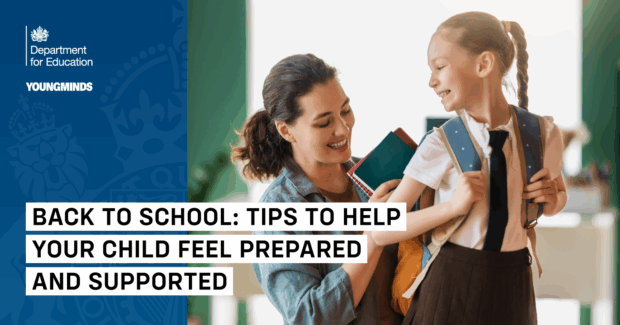
Guest post by YoungMinds
With the summer holidays coming to an end, going back to school can be daunting for some young people. Starting a new school or beginning a new school year can come with feelings of stress and anxiety. This can add to the many pressures impacting young people’s mental health, alongside factors including inequality, an uncertain future, poverty and the online world. Parents and carers may not always be sure how best to support their child, but here are some things you can try to help your child prepare for the return to school.
Get back into a good routine before term starts
Sit down with your child and create a visual timetable that maps out the day with clear times and markers for activities. This will help keep them engaged and will act as a good reference point as you settle back into routines.
Start returning to usual bedtime hours ahead of term starting. This can be tricky during the summer holiday but will really help when they start going back to school. Start getting your child to wake up at the time they would for school even if they don’t necessarily need to. You could do this gradually over a few days.
Make sure your child has some downtime before bed. Try limiting screen time before bed and try activities that can help them relax.
What to do if your child is anxious about going back to school
Acknowledge your child’s worries and anxieties and validate them. Let them know it is normal and expected for them to feel unsettled, particularly as they have been away from school for some time, and that it’s okay for them to feel however they feel.
Have continuous conversations to explore what might be underlying the anxieties. This will help you think together about things that might help lessen the worries. It might be useful for them to write or draw their worries.
If your child is worrying about something in particular, you could discuss what they could do in that situation to help them feel better. If your child often feels worried or anxious, and it’s upsetting them or making it difficult for them to think about or do other things, you can try making a worry box together.
Let your child’s school know if they’re struggling and talk to them about what support can be put in place. Some schools have mental health support teams which will be able to help in some circumstances, but accessing support for your child can be challenging and the help available varies between areas. If your child continues to struggle with their mental health and it’s affecting their daily life, speak to your GP. For more information and advice, visit youngminds.org.uk or call the YoungMinds Parents Helpline on 0808 802 5544.
Encouraging your child to talk about how they’re feeling about school
Pick times where you’re spending time together or engaging in an activity. This will help your child feel more comfortable and you can ease into asking questions about how they feel.
Use open questions such as why? What? How? rather than questions they can simply reply yes or no.
Having conversations when you are side by side and limiting direct eye contact can help things feel less daunting.
This video has more advice on how to support your child if they are struggling with school anxiety.
Practical ways to support your child’s wellbeing
Having regular check-ins with your child often makes having the bigger conversations easier.
Make time and space for them to do things they enjoy so they strike a balance with school and homework. This will help them feel less overwhelmed by the challenges of school.
Make sure you and your child know who you can speak to if they’re struggling and what support options are available in your child’s school.
Making the first week back to school easier
Start transitioning back into routines which align to the school day and ask your child what would help them ease back into the school term.
Take away as many unknowns and re-familiarise yourselves with back to school. You could make the journey to school together or start getting their uniform and bag ready.
Think about something you could do together to help celebrate the end of the first week, such as watching their favourite movie or going to the park.
Signs your child is struggling
Take note of any persistent and sustained changes, particularly if it begins to impact on different areas of their lives.
Some signs to look out for include:
- Changes to sleeping and eating behaviours, either an increase or decrease
- Withdrawing and becoming less communicative
- Not finding joy in things they usually like
- Distancing from friends or family
- Feeling upset, distressed, worried, irritable
For more information and advice, visit youngminds.org.uk or call the YoungMinds Parents Helpline on 0808 802 5544. The helpline is open Monday, Thursday and Friday 9.30am-4pm and Tuesday and Wednesday 9.30am-6pm.